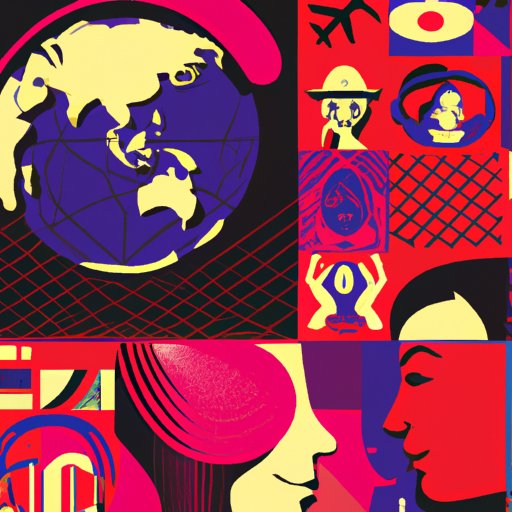Introduction
Cultural globalization is a process of interaction and integration among different cultures across the globe. It involves the spread of ideas, beliefs, practices, languages, and values across national boundaries. This phenomenon has been occurring for centuries, but in recent decades it has accelerated significantly due to advances in technology, transportation, and communication. In this article, we will explore some of the key factors that have contributed to cultural globalization.
Analyzing the Impact of Technology on Cultural Globalization
The development of new technologies has had a profound effect on cultural globalization. Social media platforms such as Facebook, Twitter, and Instagram have enabled people from all over the world to connect with each other and share their experiences. This has allowed different cultures to communicate, learn from each other, and exchange ideas more easily than ever before.
In addition, the expansion of digital technologies has made it easier for people to access information about other cultures and engage in virtual exchanges. For example, online language learning programs have provided an effective way for people to learn about different languages and cultures without having to travel. Furthermore, streaming services such as Netflix and Hulu have allowed people to watch films and television shows from around the world, giving them greater exposure to different cultures.
However, although technology has facilitated cultural exchange, it has also presented some challenges. For example, the rise of digital technologies has led to an increase in cybercrime, which can be used to target people from different cultures. Additionally, the spread of misinformation on the internet can lead to misunderstandings and misinterpretations of different cultures.

Examining the Role of International Trade in Shaping Global Culture
International trade has played an important role in shaping global culture. The emergence of global trade networks has allowed goods, services, and ideas to be exchanged between countries, creating a more interconnected world. Free trade agreements, such as the North American Free Trade Agreement (NAFTA), have further facilitated this process by reducing tariffs and other barriers to trade. This has enabled businesses to expand into new markets and access a wider range of resources, leading to increased competition and innovation.
Global brands have also had a major impact on cultural exchange. Companies such as McDonald’s and Coca-Cola have become household names in many countries, and their products have become part of local culture. In some cases, these companies have even transformed traditional practices, such as the introduction of fast food in China or the adoption of baseball caps in Japan.
Exploring the Influence of International Travel and Migration on Cultural Exchange
International travel and migration have also had a significant impact on cultural exchange. Immigration has brought people from different cultures together and allowed them to share their customs and traditions. For example, the influx of immigrants from Latin America has had a major influence on the culture of the United States, introducing new foods, music, and art. Similarly, the influx of refugees from war-torn countries has had a major impact on the culture of Europe.
Tourism has also had an impact on local cultures. Tourists often bring their own customs and practices to the places they visit, which can have both positive and negative effects. On the one hand, tourism can have a positive effect on local economies, providing jobs and income for locals. On the other hand, it can lead to a homogenization of local cultures, as tourists may prefer to experience a more “authentic” version of the culture they are visiting.
Finally, diasporas have played a major role in spreading global culture. As people migrate to different parts of the world, they often bring with them their customs, beliefs, and languages. This can have a powerful effect on local cultures, as seen in the United States, where the influence of Latino culture is becoming increasingly prominent.

Investigating the Effects of Multinational Corporations on Cultural Globalization
Multinational corporations (MNCs) have also had a significant impact on cultural globalization. MNCs have the power to influence local markets, as they often have access to greater resources and capital than smaller local businesses. This can lead to the displacement of traditional industries, as well as the introduction of new products and practices. For example, the spread of fast food restaurants and shopping malls has had a major influence on consumer culture in many countries.
At the same time, MNCs can also have a positive effect on cultural exchange. By expanding into new markets, they can expose people to different cultures and lifestyles. They can also provide employment opportunities and training, which can help to bridge the gap between different cultures. However, there are also potential drawbacks to corporate globalization, such as the exploitation of workers and environmental degradation.

Examining the Role of Media and Pop Culture in Transforming Global Culture
The media and popular culture have also played a major role in cultural globalization. Through television, movies, and music, people are exposed to different cultures and lifestyles. This can have both positive and negative effects. On the one hand, it can promote understanding and appreciation of different cultures. On the other hand, it can lead to stereotypes and misunderstandings if the portrayal of different cultures is not accurate or sensitive.
Advertising has also had a major influence on consumer culture. By targeting certain demographics, advertisers are able to shape the desires and aspirations of consumers, leading to a homogenization of global culture. This has had a particularly strong effect on youth culture, as teenagers are often bombarded with images of what it means to be cool or fashionable.
Assessing the Impact of Education on Cultural Globalization
Finally, education has played an important role in promoting cultural exchange. Language learning programs, such as those offered by universities, have enabled people to understand and appreciate different cultures more easily. Similarly, educational exchange programs, such as study abroad programs, have given students the opportunity to experience different cultures firsthand. This has allowed them to gain a better understanding of different worldviews and develop a greater appreciation of diversity.
Conclusion
In conclusion, there are a number of factors that have contributed to cultural globalization. Technology, international trade, travel, migration, multinational corporations, media, pop culture, and education have all played a role in connecting cultures and allowing people to experience different cultures. While these factors have had both positive and negative impacts on cultural exchange, overall they have enabled people to understand and appreciate different cultures in ways that would have been impossible in the past.
Further research is needed to better understand the complexities of cultural globalization and its implications for society. It is clear that cultural globalization is a complex process, and further exploration is required to assess its full impact and determine how best to manage it in the future.
(Note: Is this article not meeting your expectations? Do you have knowledge or insights to share? Unlock new opportunities and expand your reach by joining our authors team. Click Registration to join us and share your expertise with our readers.)
